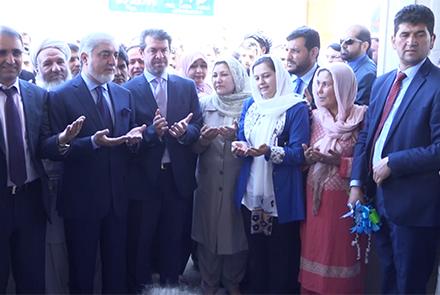A four-day expo, jointly organized by the Afghan government and the private sector, opened in Kabul on Tuesday showcasing locally made products.
Goods manufactured by over 170 companies went on display including industrial products, agricultural produce, telecommunication goods and handicrafts.
CEO Abdullah Abdullah attended the opening of the expo and said the lack of land, shortage of electricity and the absence of regulated money lending services were the three main challenges in terms of investment in the country.
Abdullah said government has addressed these challenges to some extent and is committed to supporting the private sector.
“If we want to serve our people and lead our country out of the current situation and bring positive changes to people’s lives, then without supporting the private sector it is impossible,” said Abdullah.
A number of factory owners at the exhibition meanwhile said government has failed to provide the fundamental needs for investors and is unable to even safeguard the lives of business owners.
Organizers of the exhibition said such expos will play a vital role in highlighting and overcoming problems faced by the private sector. They asked government to address their problems and to find solutions.
“Direct talks should be held with government to decrease the gap between the state and private sector and to eventually close the gap completely,” Vida Popalzai, one of the expo organizers said.
“Holding such expos helps us by up to 80 percent to market our goods and we meet international organizations and other factories through such exhibitions,” Zainab Karimi, a handicraft producer said.
Government officials meanwhile said such events also enabled them to gauge the capacity of private companies and factories.
After more than three decades of conflict, Afghanistan’s economy is edging towards recovery.
According to World Bank data, Afghanistan’s GDP is now nearly five times greater than it was in 2002 and GDP per capita has increased by 64 percent since 2002.
USAID reported last month however, that despite these promising signs, Afghanistan continues to face severe economic hurdles and remains one of the world’s poorest countries.
Insecurity, corruption and limited business enabling infrastructure threaten efforts to establish a thriving economy that attracts investment, promotes trade, creates jobs, and provides much-needed revenue to the Afghan government.
Afghanistan is highly dependent on imports, a fact reflected by its large trade deficit - approximately $7.63 billion in imports and $700 million in exports according to the International Monetary Fund.
However, government and NGOs have been hard at work in the past few years to boost investment in order to create jobs.
By supporting the Afghan government’s efforts to empower the private sector, increase exports, and create jobs, USAID is one such organization that is actively enabling Afghanistan’s economic growth, which is critical for the country’s long-term security and socio-economic stability.


